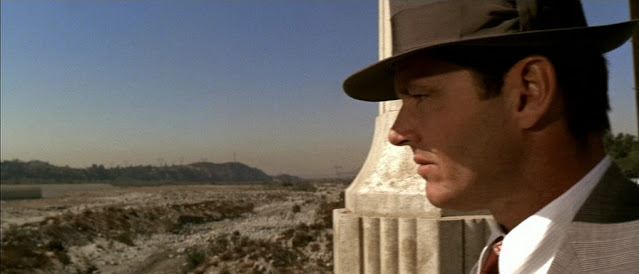CHINATOWN: A PITCH-PERFECT MODERN NOIR NIGHTMARE (SPOILERS)
Jack Nicholson has a face for the big screen. There is something about seeing his face on celluloid that elicits the feelings of awe and mystery that only cinema can. It is for this reason that I do not mind one bit that his roles are never quite as transformative as other more traditionally technically sound performers' - Willem Dafoe, say, or Meryl Streep. I always have a sense that I am watching Jack Nicholson on screen, as opposed to the character that he is portraying, but his face is just so perfect for the cinematic format that this never bothers me.
 |
| © Paramount Pictures, 1974 |
The same can be said about Nicholson's role in Chinatown, Roman Polanski's 1974 modern noir thriller co-starring Faye Dunaway. Nicholson's charisma goes a long way in shining a beacon of character-driven light through a landscape of nihilism, conspiracy and hopelessness, making his eventual failure all the more devastating.
Because, and let's get this out of the way straight away, Chinatown is a dark film. Dark in ways that are only hinted to in the film's establishing hour or so. Dark in ways that leave a pit in your stomach as the credits roll. Dark in the sense that know what director Roman Polanski was convicted of not long after this film's release. There is a black hole at the heart of this film, and its reveal in the final fifteen minutes is one of the most heartbreaking and soul-crushing moments in modern cinema. It's a black hole that we can sense as soon as the film opens us to the world of 1930s Las Angeles, a city crippled by heat and drought. This is not a city built on sustainable policy or infrastructure, and the people in charge who are pulling the strings on this city are just as ethically corrupt as the city itself.
It's within this contextual framework that Nicholson gives one of the more restrained performances of his career. There are moments where the Nicholson we all know and love now pokes through - there is an outburst surrounding an inappropriate joke in the workplace that feels like it's being delivered by Jack Torrence from The Shining - but for the most part this is a performance steeped in the nihilism, quiet cynicism and repressed trauma that erupts in the film's final moments. It's a performance that literally needs to be note perfect given that it is present in almost every frame of the film, and Nicholson comes as close to nailing it as is possible.
 |
| © Paramount Pictures, 1974 |
It is also important to acknowledge the meta-layer of ickiness at the heart of this film, an inescapable truth I alluded to earlier. No matter how hard you try, anybody seeing a Roman Polanski film with the knowledge of his history and his criminal record will see the film through that lens. But to label that misconduct as the only dark thing lurking in Polanski's past and occasionally rearing its head in his filmmaking is completely lacking an understanding of just how troubled the life of Roman Polanski has been.
The first important piece of context for seeing is films is his childhood, growing up in Poland where he was persecuted by the Nazis. It is interesting, then, to note the way in which Polanski handles a scene in Chinatown in which a character openly admits to and celebrates their own anti-Semitism.
But even more important to understanding Polanski's filmmaking, in my opinion, is the murder of his heavily pregnant wife, Sharon Tate, at the hands of the Manson Family in 1969. Hollywood changed dramatically in the wake of this event, something that has been traced and documented by writers and historians much more well informed and eloquent than I, but so did Polanski. I mean, of course he did. It is no surprise to me, then, that Chinatown is as bleak and nihilistic as it is. It is of course using and playing with the tropes of film noir, a filmic tradition already steeped in nihilism, but Chinatown takes that groundwork laid by the films of the 1940s and '50s and launches off of it into spectacularly bleak new ground.
 |
| © Paramount Pictures, 1974 |
Does this context excuse any of Polanski's criminal behaviour? Of course not. But what it does do is place Chinatown in a curious place in both the history of Roman Polanksi's films and the history of Hollywood filmmaking. With films like Taxi Driver, Alien, Dog Day Afternoon and Invasion of the Body Snatchers just around the corner, Chinatown is a part of a shift in the type of filmmaking coming out of Hollywood. Gone are the larger than life technicolour dreams that had largely dominated the theatres up to and including the 1960s, replaced with darker, more troubling films focused on character, intent on not sugar coating the reality of the world symbolically ushered in by Sharon Tate's murder.
There is a lot to say about the filmmaking - the balance between hand-held and steady, locked off shots with deliberate panning. The constant placing of mediation between Jack Nicholson and the ultimate truth, whether it be cameras, binoculars, fences or a telephone. The subtle foreshadowing of tragedy to come in the form of a birthmark on an iris, or a compulsive cigarette. The masterful editing. The moody score by Jerry Goldsmith. It really is a masterclass in mood, obsession and gradually unravelling insanity. And like all the best twists, the clues were there the whole time. We, like Jack Nicholson, were just focusing on the wrong clues.
 |
| © Paramount Pictures, 1974 |
Perhaps challenging for modern audiences for its pacing and some of its sexist and racist undertones borne of the time period, Chinatown is worth revisiting as a reminder of where so many of the traits we take for granted came from in the first place. Yes, it is using things that came before in classic film noir, but Chinatown is singular in its brutality and nihilism. It doesn't hold your hand, either. The final act is alienating and emotionally bruising - but so is real life when awful shit happens to us. What we do in the face of such insurmountable hopelessness, then, is up to us.
Further Recommendations:
- The Parallax View (1974)
- Vertigo (1958)
- The Third Man (1949)
- Double Indemnity (1944)
- Se7en (1995)
- Blade Runner 2049 (2017)
- The Godfather Part II
- Blazing Saddles
- Young Frankenstein
- The Conversation
- The Texas Chainsaw Massacre
- The Towering Inferno
- A Woman Under the Influence
- Alice Doesn't Live Here Anymore
- Black Christmas


Comments
Post a Comment